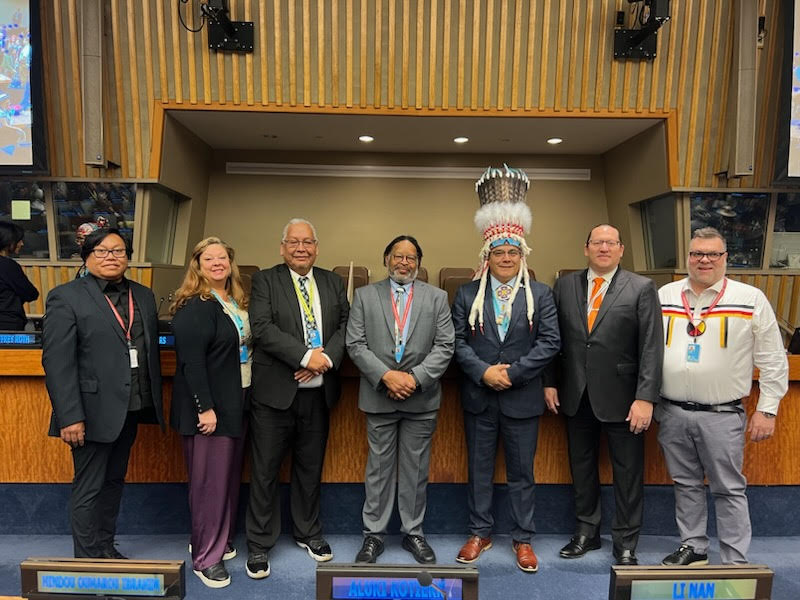
- Details
- By Native News Online Staff
In his address before the U.N. forum, Rambler referred to Chi’chil Bildagoteel, also known as Oak Flat, a sacred ceremonial ground to the Apache. The site has been the subject of a highly contested federally approved land deal between the U.S. Forest Service and Resolution Copper, a joint venture of mining giants Rio Tinto and BHP. The land deal, which was included in federal legislation that passed in 2014, will result in a mine 7,000 feet beneath Oak Flat, resulting in a crater two miles wide and 1,000 feet deep, obliterating Oak Flat.
“I request the United Nations Permanent Forum call on all (member) States to affirmatively protect Indigenous Peoples’ sacred sites under the mandate of culture, environment, health, and human rights,” Rambler said.
In 2014, the U.S. Congress passed an amendment in a massive defense-spending bill that will give Oak Flat to Resolution Copper upon completion of environmental studies regardless of the cultural and environmental damage the mine will inflict.
The U.S. Justice Department said last month that it expects to issue the environmental report needed to give the land to Resolution later this summer.
“Oak Flat is a holy site, an area of irreplaceable beauty akin to a church, no different than the Wailing Wall, Temple Mount, Australia’s Juukan Gorge, or Mecca’s Kaaba,” Chairman Rambler said. “Apache people have lived, prayed, and died at Oak Flat from time immemorial.”
Oak Flat is listed on the National Register of Historic Places as a Traditional Cultural Property and is a place where Apaches go to pray, collect traditional foods, gather medicines, hold traditional ceremonies, collect ceremonial items, and seek and obtain personal peace and cleansing. Apaches’ deep spiritual ties are inexorably connected to the landscape and cannot be replaced if the site is destroyed.
“By violating the rights of Apaches to practice our religion and maintain our spiritual health and well-being, the United States is failing to comply with international standards incumbent on them as signatories of treaties and declarations that protect these fundamental human rights,” Chairman Rambler said in his speech at the U.N,
More Stories Like This
Klamath Indigenous Land Trust Purchases 10,000 Acres as Salmon ReturnTrump signs law that revokes some limits on drilling in Alaska’s National Petroleum Reserve
Southern Sierra Miwuk Nation Gets 900-Acres ofLand Back
Chilkat Indian Village Tells New Palmer Mine Owners They Are “Not Welcome” in Chilkat Valley
Tribes, Coastal Group Ask Army Corps to Revoke Permit for Texas Export Terminal
Help us defend tribal sovereignty.
At Native News Online, our mission is rooted in telling the stories that strengthen sovereignty and uplift Indigenous voices — not just at year’s end, but every single day.
Because of your generosity last year, we were able to keep our reporters on the ground in tribal communities, at national gatherings and in the halls of Congress — covering the issues that matter most to Indian Country: sovereignty, culture, education, health and economic opportunity.
That support sustained us through a tough year in 2025. Now, as we look to the year ahead, we need your help right now to ensure warrior journalism remains strong — reporting that defends tribal sovereignty, amplifies Native truth, and holds power accountable.
 The stakes couldn't be higher. Your support keeps Native voices heard, Native stories told and Native sovereignty defended.
The stakes couldn't be higher. Your support keeps Native voices heard, Native stories told and Native sovereignty defended.
Stand with Warrior Journalism today.
Levi Rickert (Potawatomi), Editor & Publisher


